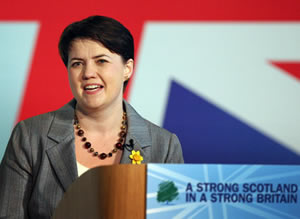Number crunching blog politicalbetting.com has revealed the extent to which Britain’s Conservative Party stands to gain in the House of Commons should Scotland vote for independence next month.
Although recent polls show separation remains the less likely outcome, the poll lead for the pro-UK, Better Together campaign is slowly narrowing and with only five weeks to go everything remains to play for.
Without Scottish MPs sitting in the Commons, the threshold for an overall majority drops significantly, so much so that even the poor showing by David Cameron’s Conservatives in the 2010 General election would have translated into a working majority government. Without Scottish members, Labour loses 41 of it’s 2010 MPs, while the Conservatives would only lose one.
The full, official name of the Conservative Party retains the word ‘Unionist’, a throwback from the Irish troubles of the 20th century, where failed attempts at Home Rule led to a violent struggle and the Irish Free State. The Party, alongside the other major Westminster players is remains dedicated to the cause of preserving the United Kingdom, despite the immediate political advantage letting Scotland go could bring.
The coming months and years are likely to be complex and may require significant constitutional change, regardless of outcome for the September 18th referendum.
If Scotland defies the polls and votes yes, there will follow a year and a half of negotiation between Holyrood and Westminster. Despite the process for separation having been put in motion by the time, the 2015 General Election will be contested in Scotland too, meaning MPs from the north of the border will sit in the Westminster Commons, knowing full well they would be ejected eleven months later. This could also give rise to the unedifying spectacle of Scottish MPs sitting in cabinet and negotiating on behalf of the rump United Kingdom over the independence settlement.
Scotland rejecting independence and remaining in the United Kingdom would also require significant change. The further devolution promised by the major parties and powers of tax and legal matters may also precipitate a necessity to answer the long standing West-Loathian question.
Former cabinet minister and party leadership contender John Redwood MP has stated this week that a century of home rule and devolution has left Westminster “lop-sided”, with disproportionate powers given to the more sparsely populated parts of the Kingdom, leaving England “without a voice”.
Devo-Max, or extensive devolution of powers, the prize offered by the government to Scottish voters in return for remaining in the Union, could open the door to a federal Britain. This is an idea which has been passed around at least since the Victorian era.
As Scotland, Wales, and Northern Ireland already have their own parliaments, the federal idea would only necessitate the creation of an English Parliament in London or another English city. With the regions free to set their own tax and spend, the national parliament would stick to the bigger issues that affects the whole nation, such as defence and foreign affairs.
YouGov’s August 7th poll on the independence question had the Better Together, or ‘No’ vote on 55 percent, with the pro-independence ‘Yes’ vote at 35 percent, figures which have remained fairly stable for months.

COMMENTS
Please let us know if you're having issues with commenting.